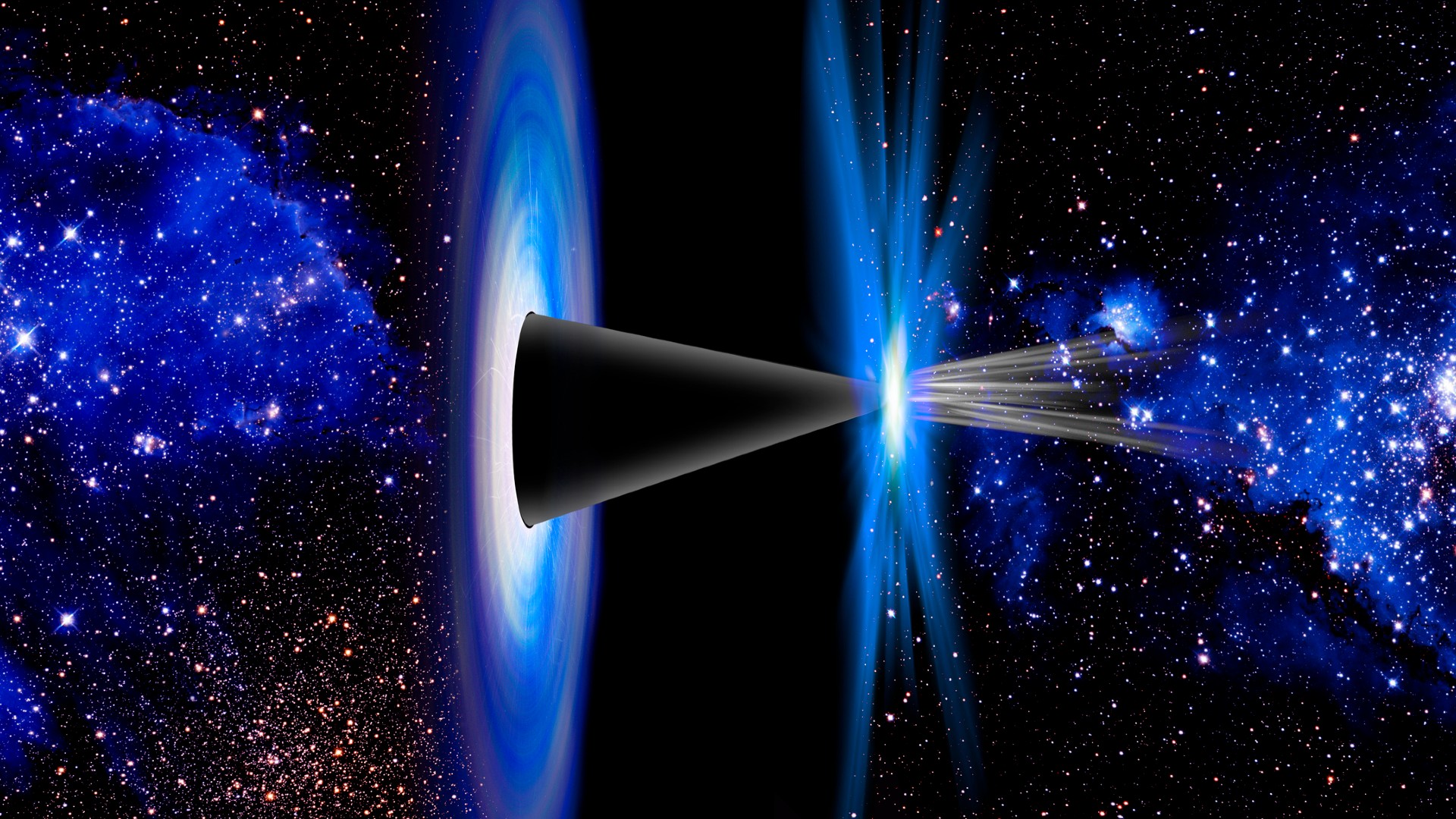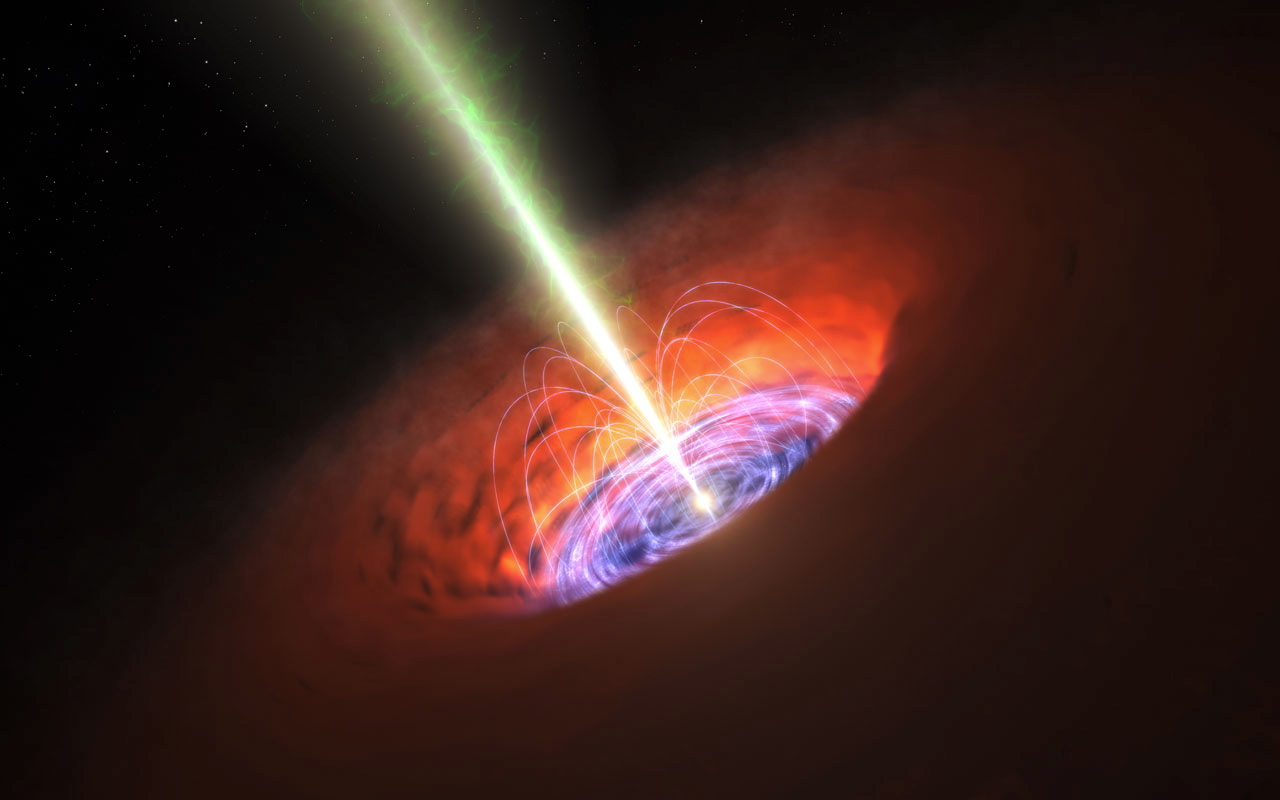Did our cosmos begin inside a black hole in another universe? New study questions Big Bang theory
"Challenging long-held assumptions is essential to scientific progress."

Breaking space news, the latest updates on rocket launches, skywatching events and more!
You are now subscribed
Your newsletter sign-up was successful
Want to add more newsletters?

Delivered daily
Daily Newsletter
Breaking space news, the latest updates on rocket launches, skywatching events and more!

Once a month
Watch This Space
Sign up to our monthly entertainment newsletter to keep up with all our coverage of the latest sci-fi and space movies, tv shows, games and books.

Once a week
Night Sky This Week
Discover this week's must-see night sky events, moon phases, and stunning astrophotos. Sign up for our skywatching newsletter and explore the universe with us!

Twice a month
Strange New Words
Space.com's Sci-Fi Reader's Club. Read a sci-fi short story every month and join a virtual community of fellow science fiction fans!
A team of scientists is proposing a bold alternative to the Big Bang theory, suggesting that our universe may have formed inside a colossal black hole residing in a larger, parent universe. The Big Bang theory, along with Einstein's general relativity, has successfully explained major cosmological phenomena, including the cosmic microwave background, the universe's large-scale structure, and its accelerating expansion often linked to dark energy.
Yet, fundamental problems remain with this theory, such as the unexplained nature of dark energy and dark matter, the singularity at the Big Bang, and inconsistencies between general relativity and quantum mechanics. "Most scientists have responded by proposing either a mysterious new form of energy — [called] dark energy — or by modifying the laws of physics," Enrique Gaztañaga, professor at the University of Portsmouth, told Space.com. "But these are drastic steps."
Gaztañaga says he and his colleagues wondered if a simpler explanation might suffice. "[Our study] began with a simple but profound question: Why is the expansion of the universe accelerating?" he said. "Our entire observable universe lies inside its own gravitational radius, meaning that from the outside, it would appear like a black hole. That led to a radical idea: What if the universe formed in the same way a star collapses into a black hole?"
The universe is believed to have begun as an extremely hot, dense point known as a singularity that underwent a rapid expansion just fractions of a second after the Big Bang. "If we rewind that expansion using known physical laws, we eventually reach a point of infinite density — a singularity — where space, time, and matter all seem to begin," said Gaztañaga. "Because the physics breaks down at that point, it has often been interpreted as a creation event: the beginning of everything."
The new study explores the idea that the universe may not have begun with a singularity but instead emerged from the collapse of a massive cloud of matter in another universe. To investigate, the research team ran simulations in search of a solution that could address some of the inconsistencies in current cosmological theories — and unexpectedly found that an exact, analytical solution describing the fundamental principles of this process already exists.
"Under the right conditions, this collapse doesn't end in a singularity — instead, it bounces and begins expanding again," said Gaztañaga. "That bounce mimics what we call the Big Bang."
While "bouncing scenarios" have been proposed in the past, this model stands out by relying solely on known laws of physics. It avoids introducing speculative particles or forces and describes a purely gravitational collapse occurring within a black hole.
Breaking space news, the latest updates on rocket launches, skywatching events and more!
"In quantum mechanics, two identical particles (like electrons or neutrons) cannot occupy the same state — they can't be in the exact same place at the same time," explained Gaztañaga. "This principle creates a kind of pressure — called degeneracy pressure — that resists compression. It's what stops the cores of dying stars from collapsing endlessly, and it's what can trigger a supernova explosion. In our model, it's this same quantum effect that halts the universe's collapse and causes it to bounce."
A hypothesis not included in the current paper is that gravity interacts directly with the Higgs field — a subatomic quantum field responsible for giving particles mass, as confirmed by experiments at the Large Hadron Collider.
In very dense and high-energy environments, quantum effects become important, says Sravan Kumar, a visiting research fellow at the University of Portsmouth and another of the study's authors. If gravity interacts with the Higgs field under these conditions, this interaction could change how gravity behaves. For example, if the interaction between gravity and the Higgs field becomes repulsive at extremely high energy densities, it could counteract the gravitational collapse. Instead of collapsing into a singularity, the universe could bounce — reversing from contraction to expansion.
"This could explain the high densities seen in cosmic microwave background data and suggest that a gravitational bounce might naturally link gravity with quantum mechanics, without needing speculative new theories," said Kumar.
"[If there is sufficient matter], gravity overcomes quantum forces such as degeneracy pressure, [which can stabilize different kinds of stars from collapse]," added Swaraj Pradhan, a visiting master's student at the University of Portsmouth and another of the study's contributors. "While we understand these forces in white dwarfs and neutron stars, we don't have firsthand data at the extreme densities after black holes form.
"Rather than presuming a singularity where physics fails, it is fair to think that quantum effects may prevent actual singularities," Pradhan continued. "The most honest answer is that we don't yet know for sure. Our model simply extrapolates well-tested [ideas] while remaining consistent with known physics."

The model predicts a small positive spatial curvature of the universe and the existence of relic objects, like primordial black holes or neutron stars, formed before a cosmic bounce.
"The gravitational bounce of our model is based on a small positive spatial curvature of the universe, a consequence of the finite mass and radius of the black hole into which the universe has collapsed, and the Pauli exclusion principle stating that not two quantum particles, more specific fermions, cannot occupy the same quantum state simultaneously," explained Michael Gabler, researcher at the University of Valencia, and another of the study's authors. "The collapse occurs completely within the framework of Einstein's theory of general relativity, and we expect the existence of relic objects, like primordial black holes or neutron stars, formed before a cosmic bounce."
"If we find such relics, especially in the early universe, it would be strong evidence in favor, [of this theory]," added Gaztañaga. "In fact, some early results from the James Webb Space Telescope (JWST) have found surprisingly old galaxies close to the origin of the universe. These findings may be hard to reconcile with the standard Big Bang timeline, but they could make sense if early relics like supermassive black holes helped galaxies form faster.
"Of course, suggesting that the Big Bang wasn't the absolute beginning of everything is controversial," continued Gaztañaga. "[Scientists] can be reluctant to move beyond familiar models. But challenging long-held assumptions is essential to scientific progress."
A study about this theory has been published in the journal Physical Review D.

A chemist turned science writer, Victoria Corless completed her Ph.D. in organic synthesis at the University of Toronto and, ever the cliché, realized lab work was not something she wanted to do for the rest of her days. After dabbling in science writing and a brief stint as a medical writer, Victoria joined Wiley’s Advanced Science News where she works as an editor and writer. On the side, she freelances for various outlets, including Research2Reality and Chemistry World.
You must confirm your public display name before commenting
Please logout and then login again, you will then be prompted to enter your display name.
